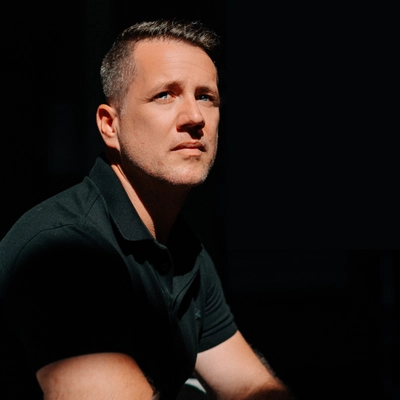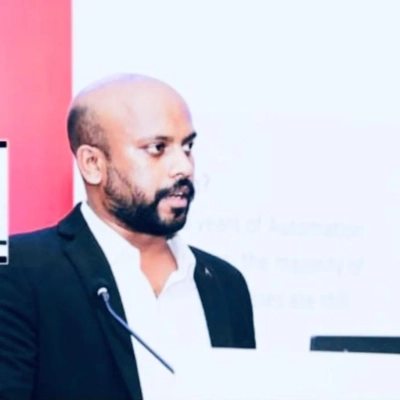We asked industry experts to share one mistake they made early on in their entrepreneurial journey that taught them a valuable lesson—and how can others avoid making the same mistake. Discover common pitfalls to avoid so you can make informed decisions and increase your chances of success as an entrepreneur.
- Prioritize Opportunities to Avoid Overcommitting
- Build Systems for Sustainable Growth
- Focus on Behavior, Not Just Attention
- Delegate Low-Value Tasks to Maximize Impact
- Seek Mentorship to Accelerate Business Growth
- Balance Tech Development with Business Strategy
- Build Core Capabilities Before Outsourcing Tasks
- Share Your Journey to Build an Audience
- Specialize Early to Defend Pricing and Growth
- Take Action to Build Confidence and Momentum
- Trust Data Over Friendship in Business
- Validate Ideas with Users Before Building
- Maintain Exclusivity to Signal Integrity
- Develop Systems as Your Business Grows
- Delegate Tasks to Scale Your Business
- Listen to Users and Solve Real Problems
- Define Boundaries to Attract Better Clients
- Trust Your Judgment and Test Ideas Firsthand
18 Entrepreneurial Mistakes to Avoid
Prioritize Opportunities to Avoid Overcommitting
One mistake I made early on was overcommitting. I was saying “yes” to nearly every opportunity that came my way. Early on, I thought getting involved in everything possible meant progress and growth. However, I soon found myself stretched far too thin, exhausted, and not achieving meaningful results in the areas truly important to me and my business.
For example, I accepted projects that weren’t aligned with my core expertise, simply because they seemed beneficial financially or in terms of relationships in the short term. I also agreed to multiple speaking and networking events, hoping they’d provide exposure, even though many had limited relevance to my actual goals. As I kept adding these commitments, I realized it was impossible for me to deliver quality attention to each of them.
What this taught me clearly is the importance of intentionally prioritizing opportunities and, crucially, learning how to say “no” thoughtfully and strategically. Now, before deciding whether to commit, I ask myself whether an opportunity aligns with my main business purposes, values, and current priorities. If not, I politely decline or defer. This practice protects my time, preserves my energy, and allows me to fully show up for the projects and opportunities that genuinely match my vision.
 Bayu Prihandito
Bayu Prihandito
Psychology Consultant, Life Coach, Founder, Life Architekture
Build Systems for Sustainable Growth
One mistake I made early in my journey was equating effort with traction—thinking that just working harder would inevitably lead to scale. I poured energy into operations, product tweaks, and firefighting without taking a breath to assess if the work was actually compounding. It took burning out on a plateau to realize: effort without leverage is just busywork in disguise.
The lesson? Strategy must precede scale. Systems thinking isn’t a luxury—it’s a survival skill. Once I started zooming out, asking better questions, and building with future-proofing in mind (team structures, margin layers, automation logic), growth became sustainable. Not because I worked less, but because I worked on better things.
If I could give one piece of advice to founders coming up: do not fall in love with the grind. Fall in love with creating systems that can run without you. Because freedom is not the reward at the end of entrepreneurship—it’s the design principle that makes it all worthwhile.
 John Mac
John Mac
Serial Entrepreneur, UNIBATT
Focus on Behavior, Not Just Attention
One mistake I made early in the journey was confusing interest in our content with actual demand for our product.
We were publishing resume tips that were getting strong engagement—high traffic, long read times, positive feedback. So I assumed that if people liked our advice, they’d definitely use our resume builder.
But when we started pushing the product more directly, conversion didn’t follow. We had content-market fit but not yet product-market fit.
What I missed was that people were curious but not committed. They were gathering ideas, not actively solving the problem we built for.
That gap taught me to
stop reading traffic as traction. Now, I focus on what people actually do next and not just what they consume. Are they clicking into the tool, finishing resumes, or coming back?
So my advice: don’t just measure attention—measure behavior. Because real demand shows up in action, not applause. That shift in thinking helped us rebuild the product around what users truly needed, not what they politely liked.
 Stephen Greet
Stephen Greet
CEO & Co-Founder, BeamJobs
Delegate Low-Value Tasks to Maximize Impact
One mistake I made early on? Doing everything myself—CEO, social media scheduler, customer service, coffee runner…I thought I was saving money, but doing low-value tasks was actually slowing my growth.
The fix? Assign a dollar value to your time. If a task is worth $20/hour, outsource it—to a VA or (even better) to AI. It’s never been easier to delegate time-sucking tasks—like coming up with social media captions—so you can stay focused on what really moves the needle.
Your genius zone is where the magic (and money) happens. Don’t trade it for busywork. Doing $20 tasks will keep you from $2,000 results.
 Laurel Robbins
Laurel Robbins
Founder, Simpli Genius AI
Seek Mentorship to Accelerate Business Growth
One mistake I made early on was trying to do everything myself. I believed that to succeed, I had to handle every single task on my own and work harder than anyone else. But this approach quickly led to burnout and made my progress much slower than it could have been. I learned that trying to do it all alone doesn’t mean you’re stronger; it often means you’re overwhelmed and stuck.
Having a mentor or coach makes a huge difference. They can guide you, help you
avoid common pitfalls, and show you a clearer path to your goals. Instead of
wasting time figuring everything out by trial and error, a mentor or coach helps you focus on what really moves the needle, saves you energy, and accelerates your growth.
My advice is don’t wait until you hit a wall. Start small by delegating simple tasks, connecting with mentors, or getting support from someone who’s already been there. You don’t have to figure everything out on your own. Getting help early saves time, energy, and lets you focus on what matters most.
 Dr. Noah St. John
Dr. Noah St. John
CEO, Success Clinic International, LLC
Balance Tech Development with Business Strategy
At one point, I made the mistake of focusing too much on the future. More specifically, I was focused more on the development of my technology for future use than on the business side of things. This was because the tech side was where my expertise lay. It was what I had gone to school for and what the focus of my business was. I had never been an entrepreneur before, so I didn’t quite understand how to split my focus. Eventually, I found a better balance, with a lot of encouragement from others.
 Edward Tian
Edward Tian
CEO, GPTZero
Build Core Capabilities Before Outsourcing Tasks
I run a content marketing agency focused on engineering and IT companies. Early on, I made the mistake of relying too heavily on freelancers. Sometimes it worked, but more often it didn’t.
It’s best to first solidify your core business capabilities in-house and then outsource repetitive or executional tasks to talented individuals or teams. This approach allows you to stay focused on higher-level strategy and building strong client relationships.
 Muhammad Rameez Arif
Muhammad Rameez Arif
Content & Communication Specialist, yieldwerx
Share Your Journey to Build an Audience
One of the biggest mistakes I made early on? Building in silence.
I spent months perfecting products in the background:
- Writing copy, tweaking features, polishing every pixel
- Thinking the launch day would be this magical moment where users would flood in.
It never came. Because no one was watching. No one knew. And no one cared.
The lesson? You can’t market a secret.
The day I started sharing the journey—the wins, the flops, the in-betweens—literally everything changed. Posts brought feedback. Feedback shaped the product. And that early audience? They became our first customers.
If you’re building something—don’t wait until it’s ready to talk about it. Talk as you build. Document > announce. Because no one remembers the perfect launch. But they do remember the story.
 Kunwar Raj
Kunwar Raj
Founder, SuperPen
Specialize Early to Defend Pricing and Growth
I spent the first three years of my business trying to be all things to everyone. If a client wanted Google, Facebook, or the Yellow Pages, I nodded and built a campaign. We grew headcount rapidly, but the work was scattered and profit leaked because every brief meant learning a new set of rules. The lightbulb moment came when one brand politely told me they had hired us for Amazon expertise, not guesswork elsewhere. I trimmed services overnight, retrained the team, and our average client fees rose within months.
Pick your lane early and guard it. Saying no is a growth strategy. The sooner founders act like specialists, the faster they can create repeatable wins and defend pricing.
 George Meressa
George Meressa
CEO, Clear Ads
Take Action to Build Confidence and Momentum
One mistake I made early in my entrepreneurial journey taught me a valuable lesson and how others can avoid making the same mistake.
I made almost every new entrepreneur’s mistake early on: I hid behind the work. I built the website, designed the logo, bought the domain, took the courses, and watched the YouTube videos. It all felt productive, but in reality, it was just polished procrastination.
The real truth? I was avoiding the real work: talking to people. I did not pick up the phone or pitch my offer, and instead stayed behind the screen and convinced myself I wasn’t ready. What I was lacking wasn’t resources—it was confidence.
And that mistake cost me time, money, and momentum.
What finally changed everything was my forced decision to ditch my comfort zone. After months of zero sales, I had no choice but to change my approach. So, I started speaking with people, running events, discussing my offer, listening, adjusting, and repeating. Within weeks, I gained clarity, confidence, and actual clients.
You don’t need another tool, course, or website. You need a conversation. Business is built on momentum, and momentum starts when you go from zero to one—one offer, one customer, one sale.
Here’s how to avoid my mistake: Talk early and often. Before your product is perfect, pick up the phone, run those events and say, “Here’s what I’m working on.”
Validate in the real world. Don’t hide behind forms, funnels, or fonts. Gain market feedback live.
Confidence is built through action. The fastest way to feel ready is to act before you feel ready.
Most people don’t realize this: you’re already good enough to sell something valuable. You don’t need to be a guru. You just need to be one step ahead of the person you’re helping.
Looking back, my most significant leap forward didn’t come from a branding exercise but from putting myself in front of people. That’s when I stopped building a business and started one.
Start talking and selling now.
 Grace Savage
Grace Savage
Brand & AI Specialist, Tradie Agency
Trust Data Over Friendship in Business
One mistake I made early on was trusting a friendship over the facts.
I co-founded a company with a friend and former colleague. On paper, it seemed like a perfect fit—but when commitments started slipping and deadlines were missed, I leaned on trust instead of traction. I gave the benefit of the doubt, had multiple check-ins, and ignored what the results were clearly showing: the follow-through wasn’t there.
We ended up missing a critical launch window, and I learned a hard but necessary truth—in business, trust is earned through action, not intention. Today, I lead with my gut, but I validate with outcomes. If I could offer one piece of advice: set clear expectations, track accountability, and never let a relationship cloud your judgment when the data says otherwise.
 James Powell
James Powell
Founder + Owner, BARKON Hydration Inc.
Validate Ideas with Users Before Building
I believe that one of the biggest mistakes I made early on was building too much before talking to real users.
We spent months perfecting features that we thought were impressive, only to learn that the actual users cared about something much simpler—speed, reliability, and ease of integration. That disconnect cost us time, budget, and momentum. It was a humbling moment that shifted how we built everything moving forward.
The lesson is clear: Do not build in a vacuum. Talk to users when your idea is still rough. Validate pain points, not just feature ideas. And when you do build, start small and release fast. Let real feedback shape what comes next.
What feels right to you may not be what matters to your users. The sooner you learn that, the faster you build something people actually want. That is where real traction starts.
 Vivek Nair
Vivek Nair
Co-Founder, BotGauge
Maintain Exclusivity to Signal Integrity
Back in 2011, I was hungry for revenue and said yes to two Malaysian fashion e-commerce sites that competed head-to-head. Three months in, they were both ranking well, yet each suspected I was giving the other “secret sauce.” The trust evaporated, refunds followed, and I watched 40% of my annual income vanish overnight. The real cost was reputational: prospects asked if their data would be safe with me.
Since then, I work with only one client per niche and market, even if it means turning away easy money. Scarcity signals integrity and lets me share every insight without filters. It also allows us to charge a premium, since we specialize in reputation-sensitive corporate clients. New founders should consider writing a simple exclusivity clause into proposals and be ready to walk when it is challenged.
 Robin Ooi
Robin Ooi
Founder, Robin Ooi
Develop Systems as Your Business Grows
One key mistake I made early in my career was attempting to scale too quickly, especially before I had good systems in place. In the startup community, there’s a relentless focus on moving quickly and not worrying so much about minor details. This is great for making progress quickly in the early stages, but it can seriously damage a business when it’s used as the default strategy for development.
The best way that I’ve found to avoid this mistake is to develop an awareness of where your business is in its lifecycle. When you’re small, focusing on momentum at all costs is fine, but as your team grows, the effects of poor systems grow bigger and more harmful. At a certain point, every business crosses a line and needs a close focus on systems and structure to avoid costly mistakes that harm growth. The larger you grow, the more important this focus becomes and the greater the negative impact of ignoring it.
 Nicholas Gibson
Nicholas Gibson
Marketing Director, Prime Ship
Delegate Tasks to Scale Your Business
Early in my entrepreneurial journey, especially when building my first eCommerce brands, I made the classic mistake of trying to do everything myself. I was the marketer, the operations guy, and the customer service rep. I thought I was saving money, but I was actually capping our growth because I was spread too thin.
The big lesson for me was that my real value lay in identifying opportunities and building systems, not in executing every single task. Once I started delegating and trusting experts, particularly in areas like tech development, things really took off. My advice to young founders is to pinpoint your unique contribution and aggressively delegate the rest. It’s how you truly scale.
 Val Narodetsky
Val Narodetsky
CEO, Hire Odesa
Listen to Users and Solve Real Problems
One mistake I made early in my startup journey was building something I thought was “smart”—instead of building something needed. I rushed into product development, obsessing over features, decks, and branding, trying to impress the world before understanding the real pain of the people I wanted to help.
As a solo founder from Nepal with huge ambition, I felt pressure to move fast. But I was building in a vacuum—guessing instead of asking. I skipped user validation, real-world feedback, and even ignored early signs that my idea didn’t fit the market. That cost me momentum and confidence.
Eventually, I hit pause. I looked back at my failures and realized they weren’t because I wasn’t trying hard enough—it’s because I wasn’t listening hard enough. I had to unlearn the idea that success means looking impressive, and relearn that real success means being useful to someone specific, now.
That’s the mindset I’m taking into my current company, a platform using AI and IoT to help small businesses navigate global trade smarter. I’m not rushing scale anymore. I’m staying close to users, testing everything early, and focusing on verified trade identities, smart logistics tools, and matchmaking features that actually solve problems.
And here’s the boldest
lesson I learned: if I believe in a founder’s solution and execution, I’m willing to put my own money behind it. That’s why I now offer $10,000 to any startup I believe in—no strings attached, just leave it with you until your company is acquired or
goes public. That’s how serious I am about betting on builders who solve real problems.
For other young founders: don’t try to look successful too early. Start small. Build with your ears, not just your hands. And don’t be afraid to throw away what doesn’t work—even if it’s something you were proud of.
 Omji Prasad Sah
Omji Prasad Sah
Founder & CEO, Globexa Inc
Define Boundaries to Attract Better Clients
A mistake I made early in my journey was saying yes to everything, every project, every client, no matter the fit.
At the time, I thought being flexible meant being successful. But what I learned quickly was that not every project aligns with your process, and not every client respects your scope or standards. I took on jobs outside my wheelhouse just to keep work flowing, and in doing so, I stretched my team thin, lost focus, and occasionally had to spend extra time fixing problems that could have been avoided.
My turning point came when I started filtering inquiries through a simple but strict checklist, such as: Is this work in our core service offering? Does the client understand the scope of drafting versus design or engineering? Do we have the right capacity to take it on with quality? Once I committed to staying within my lane, I built a stronger reputation, attracted better-fit clients, and grew my business in a way that was actually sustainable.
For anyone starting out, my advice is to really define your boundaries early, then stand by them. Don’t try to win business by being everything to everyone. Win it by being consistent, clear, and confident in what you deliver. That’s what builds a reputation worth growing.
 Brian Curran
Brian Curran
Founder, Drafting Services
Trust Your Judgment and Test Ideas Firsthand
One critical mistake I made early in my entrepreneurial journey was over-relying on external advice. When you’re starting out, lack of experience naturally drives you to seek guidance from others. However, the problem emerges when you lean too heavily on this external input: you inevitably receive conflicting and overly negative feedback.
Advisors and mentors, although well-intentioned, often inject their personal biases and limited context into their recommendations. It’s intellectually easier for people to highlight risks and potential failures rather than exploring how an idea could succeed. This pessimism can paralyze decision-making, leaving you confused, hesitant, and ultimately inactive.
The reality is that as an entrepreneur, you hold the clearest picture of your venture’s variables and circumstances. While external insights are valuable, trusting your judgment and cultivating a strong bias for action are even more crucial. The best antidote is to test, learn, and discover firsthand rather than endlessly seeking external validation or permission.
 Santiago Nestares
Santiago Nestares
Cofounder, DualEntry
 Bayu Prihandito
Psychology Consultant, Life Coach, Founder, Life Architekture
Bayu Prihandito
Psychology Consultant, Life Coach, Founder, Life Architekture
 John Mac
Serial Entrepreneur, UNIBATT
John Mac
Serial Entrepreneur, UNIBATT
 Stephen Greet
CEO & Co-Founder, BeamJobs
Stephen Greet
CEO & Co-Founder, BeamJobs
 Laurel Robbins
Founder, Simpli Genius AI
Laurel Robbins
Founder, Simpli Genius AI
 Dr. Noah St. John
CEO, Success Clinic International, LLC
Dr. Noah St. John
CEO, Success Clinic International, LLC
 Edward Tian
CEO, GPTZero
Edward Tian
CEO, GPTZero
 Muhammad Rameez Arif
Content & Communication Specialist, yieldwerx
Muhammad Rameez Arif
Content & Communication Specialist, yieldwerx
 Kunwar Raj
Founder, SuperPen
Kunwar Raj
Founder, SuperPen
 George Meressa
CEO, Clear Ads
George Meressa
CEO, Clear Ads
 Grace Savage
Brand & AI Specialist, Tradie Agency
Grace Savage
Brand & AI Specialist, Tradie Agency
 James Powell
Founder + Owner, BARKON Hydration Inc.
James Powell
Founder + Owner, BARKON Hydration Inc.
 Vivek Nair
Co-Founder, BotGauge
Vivek Nair
Co-Founder, BotGauge
 Robin Ooi
Founder, Robin Ooi
Robin Ooi
Founder, Robin Ooi
 Nicholas Gibson
Marketing Director, Prime Ship
Nicholas Gibson
Marketing Director, Prime Ship
 Val Narodetsky
CEO, Hire Odesa
Val Narodetsky
CEO, Hire Odesa
 Omji Prasad Sah
Founder & CEO, Globexa Inc
Omji Prasad Sah
Founder & CEO, Globexa Inc
 Brian Curran
Founder, Drafting Services
Brian Curran
Founder, Drafting Services
 Santiago Nestares
Cofounder, DualEntry
Santiago Nestares
Cofounder, DualEntry







